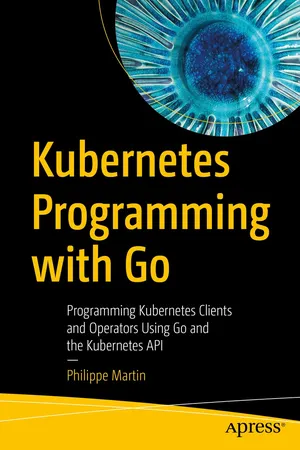
Kubernetes Programming with Go
Programming Kubernetes Clients and Operators Using Go and the Kubernetes API
- English
- ePUB (mobile friendly)
- Available on iOS & Android
Kubernetes Programming with Go
Programming Kubernetes Clients and Operators Using Go and the Kubernetes API
About this book
This book begins by introducing the structure of the Kubernetes API and which operations it serves. Following chapters demonstrate how to write native Kubernetes resources definitions using Go structures defined in the API and API Machinery libraries. Miscellaneous utilities are described to help you work with different resource fields and to convert your resource definitions to or from YAML or JSON. Next, you will learn how to interact with the Kubernetes API server to create, delete, update, and monitor resources in a cluster using the client-go library. A complete chapter is devoted to tools provided to test your programs using the client-go library. An example follows to wrap up the first part of the book, describing how to write a kubectl plugin. Next, you will learn how to extend the Kubernetes API using Custom Resource Definitions, and how to write Kubernetes resources in a generic way as well as how to create your own resources using the unstructured concept. The next chapters delve into the controller-runtime library, useful for extending Kubernetes by writing operators, and the kubebuilder framework, which leverages this library, to help you start writing operators in minutes.
After reading this book, you will have a deep understanding of the Kubernetes API's structure and how Kubernetes resources are organized within it, and have at your disposal a complete toolbox to help you write Kubernetes clients and operators.
What You Will Learn
- Understand how the Kubernetes API and its resources are organized
- Write Kubernetes resources in Go
- Create resources in a cluster
- Leverage your newly-gained knowledge to write Kubernetes clients and operators
Who is this Book for:
Software engineers and (Site Reliability Engineers) SREs wishing to write Kubernetes clients and operators using the Go language.Tools to learn more effectively

Saving Books

Keyword Search

Annotating Text

Listen to it instead
Information
Table of contents
- Cover
- Front Matter
- 1. Kubernetes API Introduction
- 2. Kubernetes API Operations
- 3. Working with API Resources in Go
- 4. Using Common Types
- 5. The API Machinery
- 6. The Client-go Library
- 7. Testing Applications Using Client-go
- 8. Extending Kubernetes API with Custom Resources Definitions
- 9. Working with Custom Resources
- 10. Writing Operators withthe Controller-Runtime Library
- 11. Writing the Reconcile Loop
- 12. Testing the Reconcile Loop
- 13. Creating an Operator with Kubebuilder
- Back Matter
Frequently asked questions
- Essential is ideal for learners and professionals who enjoy exploring a wide range of subjects. Access the Essential Library with 800,000+ trusted titles and best-sellers across business, personal growth, and the humanities. Includes unlimited reading time and Standard Read Aloud voice.
- Complete: Perfect for advanced learners and researchers needing full, unrestricted access. Unlock 1.4M+ books across hundreds of subjects, including academic and specialized titles. The Complete Plan also includes advanced features like Premium Read Aloud and Research Assistant.
Please note we cannot support devices running on iOS 13 and Android 7 or earlier. Learn more about using the app